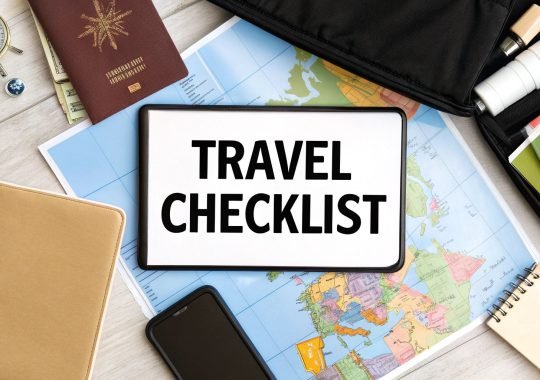|
Getting your Trinity Audio player ready...
|
Solo travel requires awareness, discipline, and adaptability. Every choice, from transportation to accommodation, comes down to one person’s judgment, which makes financial awareness essential. Managing money independently while traveling allows for flexibility without unnecessary worry. When expenses stay organized, every decision feels more deliberate and less reactive.
Modern travelers rely on careful planning to maintain both freedom and control. Financial mindfulness doesn’t take away from the travel experience; in fact, it supports it. Smart planning turns independence into confidence, helping travelers enjoy more of what matters while keeping finances steady throughout the trip.

Keeping Tabs on Daily Spending
Tracking expenses daily is crucial; otherwise, they will result in unexpected setbacks. Solo travelers handle every payment themselves, so awareness of how much gets spent each day is crucial. Recording costs for food, transport, attractions, and accommodation builds a clear overview of what the trip actually requires. Accurate tracking also makes budgeting adjustments simple if plans shift.
Using a money tracker helps maintain control without constant calculation. Most tools designed for travelers automatically organize transactions, categorize spending, and even manage currency changes. Monitoring financial details in real time keeps spending balanced and eliminates the uncertainty that often appears during longer trips.
Planning Routes Wisely
Route planning has a direct effect on both cost and experience. Efficient paths between destinations save time and reduce unnecessary expenses. Travelers who organize routes around logical connections, like nearby cities or affordable transit options, avoid paying for long detours or repeated backtracking.
Balancing practicality with exploration keeps the trip enjoyable and sustainable. Strategic routing means fewer last-minute bookings, more consistent prices, and better use of time. Each destination fits naturally into the next, creating smoother travel days and a stronger sense of control over the budget.
Pacing Travel Days
Fast schedules often result in higher costs and lower satisfaction. Moving from place to place too quickly increases spending on transportation, accommodations, and meals. Taking more time in each location reduces travel pressure, gives access to better rates, and allows for deeper experiences.
Slow travel often uncovers the value of local living. Longer stays make it easier to negotiate better deals, discover local favorites, and connect with residents who offer insight beyond guidebooks. A slower pace saves money while adding meaning to the overall experience.
Flexible Itineraries
Plans that allow room for adjustment lead to smarter decisions on the road. Unexpected opportunities, such as affordable local tours or seasonal events, often appear without notice. Flexibility lets travelers take advantage of such moments without financial stress. Rigid itineraries, on the other hand, tend to create extra costs when cancellations or changes arise.
Building open space into a schedule makes solo travel easier to manage. Free days or adaptable plans provide breathing room for rest, better deals, and genuine discoveries.
Packing Light
Packing efficiently reduces expenses from the start. Extra luggage adds airline fees, slows movement, and limits freedom once on the ground. Carrying only essential items simplifies travel and removes the need to pay for storage or additional transport space.
A smaller load also supports safety and independence. Traveling light makes transitions between destinations faster and less tiring. Essential, well-chosen items keep packing focused on utility rather than excess, allowing more attention to go toward the experience itself.
Choosing Experiences
Spending on experiences often brings the strongest return. Local tours, workshops, or cultural events create a deeper understanding of a destination without demanding luxury-level budgets. Travelers who focus on engagement instead of accumulation often gain value that lasts far beyond the trip itself.
Selecting experiences carefully also prevents unnecessary expenses. Knowing which activities genuinely align with personal interests helps avoid paying for things that don’t leave an impression.
Eating Smart
Food costs can fluctuate quickly while traveling, especially when relying on tourist-focused spots. Exploring local markets, small diners, and street vendors offers authentic meals at reasonable prices. Such options support local businesses and often reveal more about the culture than restaurants designed for visitors.
Planning around local eating patterns can also reduce waste. Buying fresh ingredients or sharing small meals throughout the day aligns with how locals live and keeps spending manageable.
Skipping Souvenir Splurges
Souvenirs tend to take up money and luggage space that could serve better purposes. Choosing smaller, practical items or none at all helps travelers stay light and focused on what matters most. The goal is to bring back memories, not clutter.
Photographs, journals, or local recipes hold more personal value than mass-produced souvenirs. Travelers who resist impulse buys find that their experiences feel fuller and less commercial. Financial awareness grows when purchases are based on meaning rather than habit.
Knowing When to Spend
Some situations justify extra spending. Paying more for a secure hotel, reliable transport, or quality gear often saves money and stress later. Recognizing when comfort or safety deserves priority reflects good judgment rather than indulgence.
Evaluating value rather than price helps maintain balance. Solo travelers who plan for a few intentional splurges, such as a guided tour or a local experience, gain both enjoyment and confidence in their decisions. Smart spending supports the overall travel purpose instead of limiting it.
Safe and Smart Stays
Accommodation choices shape both the quality and the cost of solo travel. Selecting safe, reasonably priced areas reduces risk and allows easier access to transport and essential services. Neighborhoods outside the main tourist zones often provide lower prices and a more authentic environment.
Researching before arrival builds confidence. Reading recent reviews, checking maps, and verifying amenities prevent misunderstandings that lead to unexpected costs. A well-chosen stay removes distractions and supports a steady travel pace.
Taking Breaks Between Trips
Continuous movement can strain both finances and focus. Scheduling breaks between trips allows time to recover, organize finances, and plan future travel more carefully. Such pauses help avoid fatigue and keep travel from becoming a routine rather than a meaningful pursuit.
Reviewing past expenses during breaks provides insight into spending habits. Adjusting plans based on that information helps maintain control and consistency. Each pause strengthens awareness, keeping travel intentional and financially stable over time.
Solo travel teaches awareness in every form, that is, time, energy, and money. Staying mindful of financial details allows travelers to focus fully on the places they visit instead of the costs they carry. Each habit, from route planning to careful spending, supports the goal of traveling independently and sustainably. The more clearly travelers see where their resources go, the more freedom they gain to experience the world with confidence and balance.



